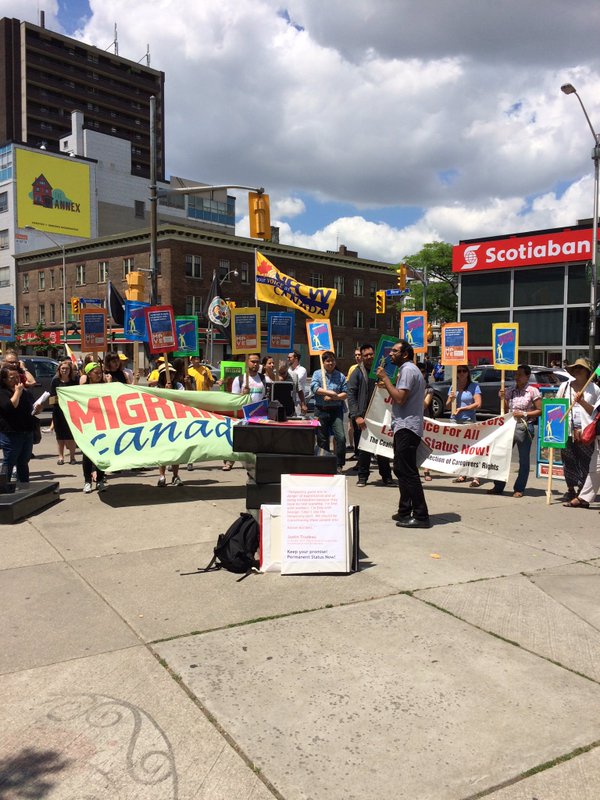Like this article? rabble is reader-supported journalism. Chip in to keep stories like these coming.
The Coalition for Migrant Worker Rights Canada (CMWRC) has organized #StatusNow actions across Canada to demand immediate permanent resident status for all migrant workers.
The actions coincide with Parliament’s review of the Temporary Foreign Worker Program (TFWP), which began on May 11 and will conclude on June 15 when Parliament’s Standing Committee on Human Resources, Skills and Social Development and the Status of Persons with Disabilities (HUMA) adopts their draft report.
The review has currently only heard from four migrant workers.
CMWRC’s #StatusNow actions are calling for permanent resident status for migrant workers, open work permits, to allow migrant workers the ability to change employers, and human rights based reform of the program.
TFWP: Conservative overhaul makes workers more disposable, vulnerable
The TFWP allows Canadian employers to hire migrant workers temporarily. The program has been around in various iterations since 1973, but has come under heightened scrutiny in the past decade.
In April 2011, the four in four out law was introduced, which restricted migrant workers to four year work permits. After that period, workers would not be granted another work permit for an additional four years.
In 2014, the Conservatives overhauled the program and introduced policies that made workers “more disposable” and more vulnerable to exploitation. The 2014 changes also made it more difficult for migrant workers to obtain permanent residency.
CMWRC’s demands include both short-term measures, like issuing open work permits and granting permanent immigration status to all migrant workers, and long-term measures aimed at a complete reform of the Canadian immigration system.
Migrant voices need to be heard in review
On May 11, HUMA heard from four witnesses, two from the Department of Employment and Social Development, and two witnesses from the Department of Citizenship and Immigration.
On May 16, the second day of the review, HUMA heard from 14 witnesses. Only four of these witnesses were migrant workers. Gabriel Alladua and Gina Bahiwal, members of CMWRC testified, as did Francisco Mootoo, a member of the Temporary Foreign Workers Association, and Ericson Santos De Leon, a live-in caregiver and a member of Migrante, in Quebec.
Mootoo, like the other migrant workers who testified in front of HUMA on on May 16, only had three minutes to relate his story. “I hope that the HUMA committee seriously listens to our collective voice when reviewing the TFWP,” Mootoo said in a CMWRC press release.
Mootoo, who is from the island of Mauritius, spoke with rabble in a telephone interview about his experience as a migrant worker in Quebec. He was a cabinet maker in Mauritius and came to Quebec as part of a circular migration program.
After completing four rounds of interviews, he was recruited by Olymel as a day labourer in a slaughterhouse in Saint-Esprit, outside of Montreal.
Mootoo applied for an industrial butcher position within the company after a year of working as a unionized worker. In 2014, after two years in Quebec, Mootoo thought he would be able to apply for permanent residency. He was just two years away having to leave Canada, as per the four in four out law.
Mootoo and 34 other migrant workers were rejected for permanent residency in 2015. Quebec no longer recognized the national occupation code, and Mootoo was therefore unable to obtain permanent residency under the Programme de l’expérience québécoise.
Mootoo said that although he and other workers for Olymel have been able to stay in Quebec, many have had to leave. “Not everyone was lucky enough to get their papers,” Mootoo noted. “I know two people who are going back home just this week.”
“It’s been four years since I’ve seen my wife,” Mootoo told rabble. “And while I’ve made many sacrifices to be able to come to Quebec, my life is here now, in Quebec, in Canada. I left my job in Mauritius and I can’t go back.”
House brawl bumps caregiver Teta Bayan
Liberal MP for Cambridge Brian May, the HUMA Chair, told rabble in an email that groups continue to ask to appear before the committee to testify and share their stories. May said that “all groups are able to submit briefings, even if they don’t appear as witnesses, which will be considered in the report.”
But as Teta Bayan knows all too well, the MPs that make up HUMA have the control over whose voices will influence their report. Bayan is a migrant caregiver in North York and a member of the group Caregivers Action Centre. She was supposed to testify via video conference on May 16.
The HUMA meeting was suspended before Bayan testified because the House of Commons was arguing about Trudeau’s use of force in an incident which has now been termed “elbowgate.”
In an op-ed in The Globe and Mail, Bayan called on HUMA to grant all migrant workers open work permits. “Canada’s laws support abuse,” Bayan writes. “The vicious cycle of abuse, exploitation and precariousness that we experience can only be fixed by setting us free from tied work permits and giving us our immigration status upon arrival in Canada.”
In addition to the #StatusNow events, CMWRC has circulated a petition that has garnered just over 2,000 signatures.
Five #StatusNow actions will take place in Charlottetown, Edmonton, Montreal, Toronto, and Kelowna between May 28 and May 31. More actions are planned through June 6.
Editor’s note: A previous version of this article incorrectly spelled Francisco Mootoo’s name. This has been revised and we thank Mootoo for his correction.
Sophia Reuss is a Montreal-based writer, editor, and is a recent graduate of McGill University. She’s interested in how online media and journalism facilitate public accessibility and conversation. Sophia also writes and edits for the Alternatives International Journal.
Photo: Twitter: Gustavo Monteiro/@GuMonteiro



